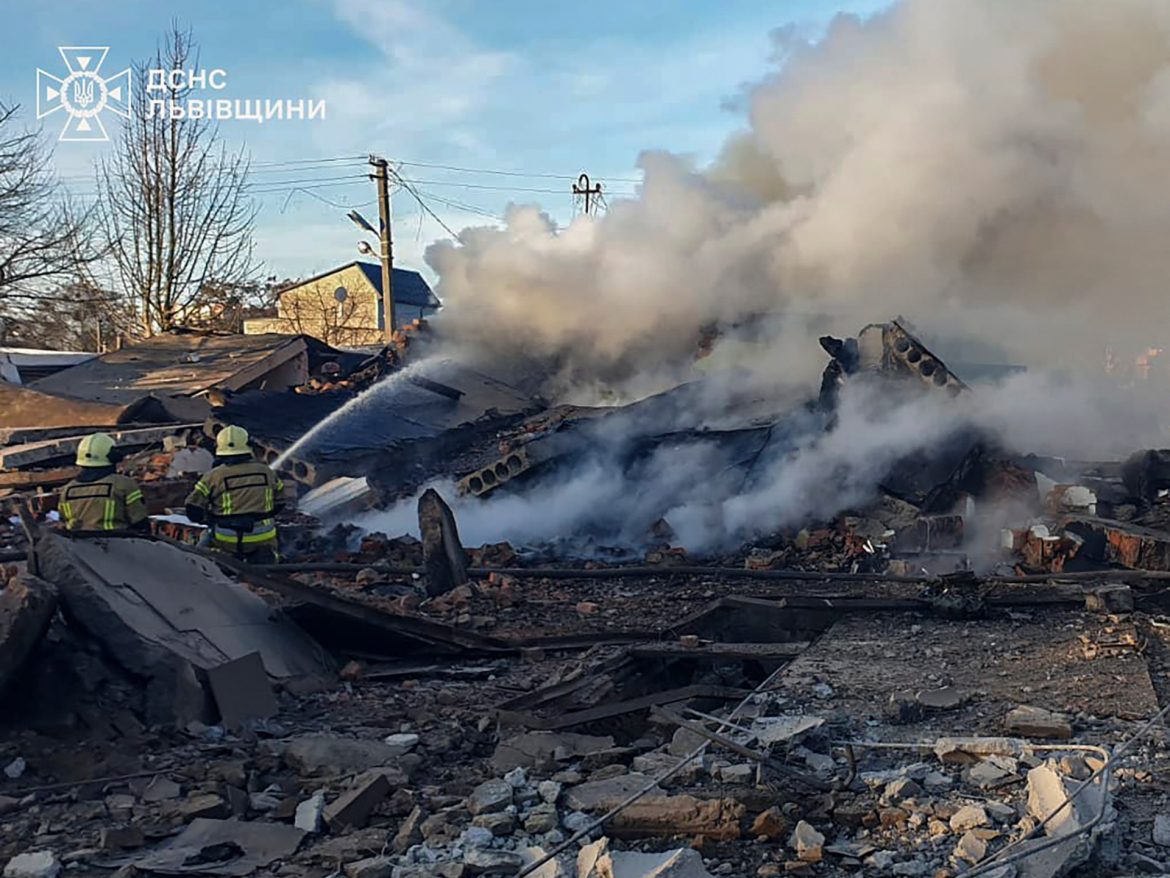Russia has carried out its largest air attack on Ukraine in months, launching 120 missiles and 90 drones that killed several people and caused severe damage to the power system, officials said.
Ukrainian President Volodymyr Zelenskyy said on Sunday that his country’s defences shot down 140 air targets across Ukraine. Various types of drones were deployed, he said, including Iranian-made Shaheds as well as cruise, ballistic and aircraft-launched ballistic missiles in one of the largest barrages of the nearly three-year war.
“The enemy’s target was our energy infrastructure throughout Ukraine. Unfortunately, there is damage to objects from hits and falling debris,” Zelenskyy said in a statement on the Telegram messaging app.
The state grid operator Ukrenergo announced nationwide emergency power restrictions for Monday. Two power cuts of several hours are planned between 6am and 10pm (04:00-20:00 GMT), the company announced on Telegram.
A Russian drone attack on the southern Ukrainian city of Mykolaiv killed at least two people and wounded six others, including children, Zelenskyy said, adding that “all areas” were left without power.
Poland, a NATO member that borders Ukraine to the west, said it had scrambled its air force as a precaution.
Explosions were heard across Ukraine on Sunday, including in the capital, Kyiv, the key southern port of Odesa, and the country’s west and central regions, according to local reports.
Ukraine’s energy operator DTEK on Sunday announced emergency power cuts in the Kyiv region and also in the east.
Earlier, Ukraine’s Energy Minister German Galushchenko said on Telegram that “a massive attack on our energy system is ongoing” and that Russian forces were “attacking electricity generation and transmission facilities throughout Ukraine”.
Following the strike, Ukraine announced it would apply “restriction measures” on power use in all its regions on Monday.
Russian attacks have hammered Ukraine’s power generation capacity since Moscow’s all-out invasion of its neighbour in February 2022, prompting repeated emergency power shutdowns and nationwide rolling blackouts.
‘Horrible, horrible attacks’
UN Secretary-General Antonio Guterres condemned Russian air strikes and said that “Directing attacks against civilians and civilian objects is prohibited by international humanitarian law.”
“Any such attacks are unacceptable and must end immediately,” his spokesman Stephane Dujarric said in a statement.
French President Emmanuel Macron also said that his Russian counterpart Vladimir Putin “does not want peace” in Ukraine and “is not ready to negotiate” an end to the war, following the attack.
Macron added that it was “clear” that Putin “intends to intensify the fighting”.
European Commission President Ursula von der Leyen reiterated that Ukraine could rely on the European Union for help following the attack.
“We have seen the horrible, horrible attacks this night of Russia against Ukraine, destroying civil energy infrastructure and costing an incredible amount of human lives,” she told Brazil’s GloboNews as she arrived in Rio de Janeiro on the eve of a summit of Group of 20 (G20) nations.
“We will stand by Ukraine for as long as it takes. We are supporting Ukraine in this winter specifically where infrastructure for energy is concerned,” she said, adding “Ukraine can count on us.”
Ukrainian officials have routinely urged their Western allies to bolster the country’s air defences to counter assaults and allow for repairs.
On Sunday, US media reported that Washington will allow Ukraine to use its long-range weapons to attack inside Russia, a decision that Zelenskyy has repeatedly asked for.
While some US officials have expressed scepticism over allowing long-range strikes, the decision could help Ukraine when Russian forces are making gains. Sunday’s large-scale Russian assault came as Russian forces advanced at the fastest rate since the war’s earliest days.
To add to the pressure, North Korea has sent thousands of soldiers to the Russian region of Kursk to help Moscow fight off a Ukrainian incursion that started there in August.
‘Root causes’ of the war
On Saturday, Zelenskyy said his side would do everything possible so that the war ends in 2025 “through diplomatic means”.
His comments came after Russia’s President Putin held his first direct conversation in almost two years with German Chancellor Olaf Scholz, saying an agreement to end the war would also need to address the “root causes” of the conflict which, according to Putin, include NATO’s expansion.
Though Scholz urged Putin to pull out his troops, which occupy a fifth of Ukraine, Kyiv bridled at a call that it said reduced Putin’s isolation from other world leaders.
Polish Prime Minister Donald Tusk echoed this sentiment: “The attack last night, one of the biggest in this war, has proved that telephone diplomacy cannot replace real support from the whole West for Ukraine. The next weeks will be decisive, not only for the war itself, but also for our future.”
Support for war-torn Ukraine is also in question following the victory of Donald Trump in the United States presidential election.
In the run-up to the vote, Trump had repeatedly questioned the amount of US money spent on military aid for Ukraine. Vice President-elect JD Vance has suggested that a Trump administration could favour letting Russia keep the Ukrainian land it has seized on the battlefield.
Meanwhile, the outgoing administration of US President Joe Biden has pledged to strengthen its support for Kyiv in its remaining time in power, and the leaders of the Group of Seven (G7) alliance have reaffirmed support for Ukraine “for as long as it takes”.
